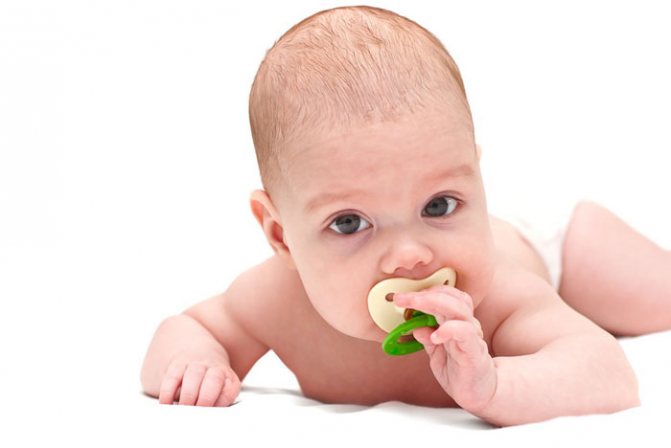Why does a 2-3 month old baby stick out his tongue?
If an adult's tongue sticks out or falls out, this may indicate excessive enthusiasm for the current activity or the development of a disease such as segmental dystonia. What will cause a child to stick out his tongue?
A baby at the age of 2-3 months sticks out his tongue in order to eat, play, or because he is developing a disease. This may be a sign that the baby is hungry. In this way he tells his mother that it is time to feed him. While eating, the baby opens his mouth and sticks his tongue out to make sucking movements, so when he wants to eat, he makes similar movements reflexively. You need to offer your baby a breast or a bottle - perhaps, after eating, he will hide his tongue. Experts identify a number of reasons (besides hunger) that can lead to a baby sticking out his tongue.
| Category | Causes | Note |
| Natural | A game | Feel the gums, touch the lips, lick the rattle - this is how the baby plays and learns about the world. |
| Copy | If one of the parents entertains the child by making faces and sticking out his tongue, soon the baby will begin to do the same. | |
| Tongue size | At the age of 1-3 months, the tongue is too large, long and simply does not fit into the mouth. This problem resolves itself within six months. | |
| The room is hot | Sticking out his tongue, he tries to cool himself down a little. | |
| Sign of teething | Most babies experience the first signs of teething at 4-5 months of age, but for some, painful sensations in the gums appear a little earlier, sometimes in two-month-old babies. Sticking out his tongue, he moves it along the gums - this is how the baby tries to massage and moisten them a little. | |
| Pathological | Lack of iodine in the body | The symptom may indicate the development of hypothyroidism. |
| Irregularly formed facial muscles/distorted jaw | You must consult a doctor immediately. | |
| Intracranial pressure | In most cases, this diagnosis is made already in the maternity hospital, and the necessary therapy is prescribed there. |
READ ALSO: What are the main symptoms of teething in a baby?
A child sticks out his tongue: in what cases should you not worry?
- If the baby is in a great mood and just wants to play and indulge.
- The child is teething - his gums swell and hurt. The baby sticks out his tongue in an attempt to relieve the pain, scratching his gums with his tongue.
- The little one is training his tongue muscles. This way he naturally prepares himself for the beginning of speech activity.
- He is hungry - sticking out his tongue and trying to chew it instead of eating. Unable to express his desire in any other way yet, he does it in his own unique manner.
- Physiological features. The lack of space in the lower jaw and the large tongue lead to the fact that the organ does not fit in the mouth and the baby experiences discomfort. As a rule, after six months everything returns to normal.
- High air temperature and dryness lead to drying out of the oral mucosa of the child, who tries to moisten it in this way.
- Insufficient length of the hyoid frenulum is noticeable already in the maternity hospital.
There's a reason not to worry
Adults must learn to distinguish between when a baby's tongue sticking out does not pose a health hazard and those moments when one should really be alarmed. You just need to carefully monitor the baby in order to notice the symptoms of the disease in time and prevent its development and adverse consequences.
When is there nothing to worry about?
If the baby is cheerful and active, eats well and sleeps peacefully (without throwing his head back), then he is healthy, and his tongue sticks out for one of the natural reasons. You should also pay attention to the color and shape of the tongue - if there is no swelling or white coating, then most likely there is no cause for concern. If parents are alarmed by the protruding tongue of a baby, but there are no visible alarming symptoms, it is better to visit a pediatrician. This way, pathology can be completely excluded, and if it is detected, it can be treated at an early stage. The characteristic symptoms can be found in the photo accompanying the article.
Nuances that should alert you
Most diseases accompanied by tongue protrusion in infants respond well to treatment, especially if they are identified and treated at an early stage. A protruding tongue rarely acts as the only symptom of the disease (the exception is when the baby constantly shows only the tip of the tongue from the mouth).
Sometimes this phenomenon is perceived as one of the symptoms of dementia, but debility in babies under one year old can only be congenital and is accompanied by specific symptoms that are difficult to confuse with anything. In addition to the fact that the child’s mouth is open and his tongue is sticking out, parents should be alerted to the appearance of one of the following nuances:
- swelling of the tongue,
- dry skin,
- the baby does not pull out his tongue, but sticks it out, cannot keep it in his mouth,
- pale yellow skin
- the child is constantly worried, cries, sleeps poorly,
- baby spits up frequently
- the baby constantly sticks out only the tip of his tongue,
- pulsating and bulging fontanel,
- in a dream the head tilts back,
- there is a white coating on the tongue and in the oral cavity,
- the child’s inability to control his facial expressions.
Tongue keeps falling out of mouth
Why does a child's mouth remain open and his tongue keep falling out? This may indicate that he is suffering from hypothyroidism. The disease develops in children whose mothers experienced iodine deficiency during pregnancy. In modern perinatal centers, tests for hypothyroidism are taken from a child almost immediately after birth.
READ ALSO: What to do if your 2-month-old baby is drooling a lot?
Obvious symptoms of the pathology become noticeable from 3-4 months of age. The tongue becomes large, swollen and does not fit completely into the oral cavity. There is also a delay in development, roughness of facial features, the skin becomes dry and acquires a yellowish tint. If such symptoms appear, you should consult a doctor immediately.
Newborn sticks out tongue and throws back head
If a newborn throws his head back in his sleep and sticks his tongue out of his mouth, this may indicate that the child is suffering from intracranial pressure. Some children with this diagnosis are characterized by throwing their head back not only during sleep, but also during feeding. In international pediatric practice, ICP is considered a serious, dangerous and very rare disease that can only be treated in a hospital setting.
Pediatric doctors in the CIS, on the contrary, often diagnose this pathology, and the pathology is not always considered an indication for hospitalization. Throwing back the head may indicate muscle hypertonicity. To determine the cause of symptoms, it is recommended to do an ultrasound of the brain.
A white coating is visible on the tongue
If a baby suffers from an oral disease, he sticks out his tongue to relieve his condition a little. Newborns are often diagnosed with stomatitis and candidiasis (thrush) (we recommend reading: methods of treating oral stomatitis in newborns). In the first case, there will be ulcers on the mucous membranes in the mouth, and in the second, parents will find a white coating on the tongue. It may take several weeks or months for the child's condition to normalize.
Why does the disease appear?
Congenital macroglossia develops during prenatal development of the fetus. Various factors can influence the development of pathology. It can develop independently against the background of such diseases:
- Down syndrome;
- malocclusion;
- tuberculosis;
- hormonal dysfunctions;
- syphilis;
- infectious processes in the body;
- impaired microcirculation of blood fluid, hemorrhages in the oral cavity;
- organ abscess;
- glossitis;
- bruises, injuries, neoplasms of various types;
- lymphadenitis;
- development of a purulent focus;
- abnormal structure of the tongue muscles;
- acromegaly (a disease associated with excess production of growth hormone);
- myxedema (“mucous swelling” due to a lack of thyroid hormones);
- acute allergic reaction;
- actinomycosis lesion.
The listed diseases may be accompanied by such a symptom. Therefore, it is important to consult a doctor in a timely manner to determine the cause of macroglossitis and prescribe adequate therapy.
Diagnosis of possible problems
To diagnose possible problems, you will need to visit a qualified specialist. An experienced pediatrician will be able to identify the characteristic symptoms of most of the pathologies described above based on an examination of the child and a survey of parents. Almost all pathological conditions that are accompanied by protruding tongue in an infant have specific symptoms.
If you suspect hypothyroidism, you will need additional consultation with an endocrinologist and a laboratory blood test (now this is often done in the maternity hospital). If the doctor suspects that the child is suffering from ICP, he will refer the child for examination to a neurologist. Based on the results of the consultation, neurosonography may be prescribed.
The child is over 6 months old
For infants under one year of age, the reasons why they stick out their tongue will be the same in most cases. At the age of 6 months and older, children tend to play and make faces more in order to entertain themselves and others and get some exercise.
If a 6-7-8 month old child sometimes sticks out his tongue and immediately hides it, we are talking about a completely natural action. Alarming accompanying symptoms are similar to those presented above.
Why does a child chew his tongue?
You are here: Home > Articles > Parents > Care and development
July 30, 2014 | views: 41,812
Sometimes parents of babies who are not even six months old notice a strange thing - the child is chewing his tongue. But this happens not only at this age, some children can do this at one or even two years old. It is not surprising that mothers panic; they think that this is due to problems with the baby’s nervous system. However, this is not always the case, and there are many reasons for tongue chewing.

Why does a child chew his tongue? Causes
One of the main reasons why a child chews his tongue is to prepare the baby for chewing adult food. Usually by 4-5 months, children begin to drool. Many mothers associate this with the first teeth, but the active work of the salivary glands may also be due to the fact that the baby will soon need to process more solid food.
Another reason may be the child's hunger. If it's feeding time, your baby may chew his tongue instead of the food he craves. It is clear that there is nothing special about this. Time will pass when the baby learns to ask for food and stops chewing his tongue.
Children who are weaned off the pacifier early or are not allowed to suck their thumbs by wrapping the baby in a diaper or putting anti-scratch pads on their arms often chew their tongues. A child, accustomed to having something in his mouth all the time, begins to suck or chew his tongue.
Another very good reason for a child’s tongue sucking is rapid teething. Many children refuse to use a teether and prefer thumb sucking or tongue chewing. Even if the baby’s first incisors have already appeared, and he continues to chew his tongue, do not worry, because there will be many more teeth ahead.
Sometimes a child chews his tongue when he is thinking intently about something or is very busy with something. Watch your baby as he enthusiastically plays with himself. The baby can chew its tongue, suck it and even stick it out. There is nothing special about this, because even adults, when they are immersed in thoughts or busy with something, can do things that are even unusual for him - winding his hair around his fingers, biting his lower lip, etc.
Children often chew their tongue when they are bored. This usually applies to babies who have already crossed the one-year mark. Lack of attention from adults often leads to the fact that children, trying to occupy themselves with something, acquire different habits - biting their nails, picking their noses, etc.
As you can see, there are many reasons why a child chews his tongue. And in most cases, the problem goes away on its own over time. But, if you notice that your baby chews his tongue without ceasing, that is, obsessively and for quite a long time, contact a neurologist to be sure to dispel all doubts.
How to stop a child from chewing his tongue?
So, we figured out the reasons. And as you can see, there is nothing terrible to worry about. However, a habit is a habit, and it can stay with a person for a long time. Therefore, it is still worth trying to wean your child from this simple activity.
Firstly, you need to distract the baby from chewing his tongue, for example, give him a pacifier. If your child does not suck on a pacifier, give him a toy that he will happily put into his mouth and chew better than his tongue. Secondly, let the child understand that this cannot be done. When your child chews his tongue, lightly touch his lips and say “No!” Even a six-month-old child will understand that he is doing something wrong.
Try to accustom your child to the pacifier; after all, a pacifier is better than fingers in the mouth, and even more so, chewing the tongue. There is no need to wean off a pacifier early, especially if the child does not want to wean himself off it. If you take the pacifier by force, don't be surprised if the baby sucks and chews its tongue.
Do not swaddle your baby after three months. Usually from this age, and sometimes earlier, children begin to study their hands and taste them. Let the kids develop as they should.
If the child is already older - a year, a year and a half, but continues to chew his tongue, then just tell him that it is ugly to do this. At this age, children already understand many things very well. In general, try to pay more attention to your baby. The more you communicate and play with your baby, the less time he will have for various bad habits.










